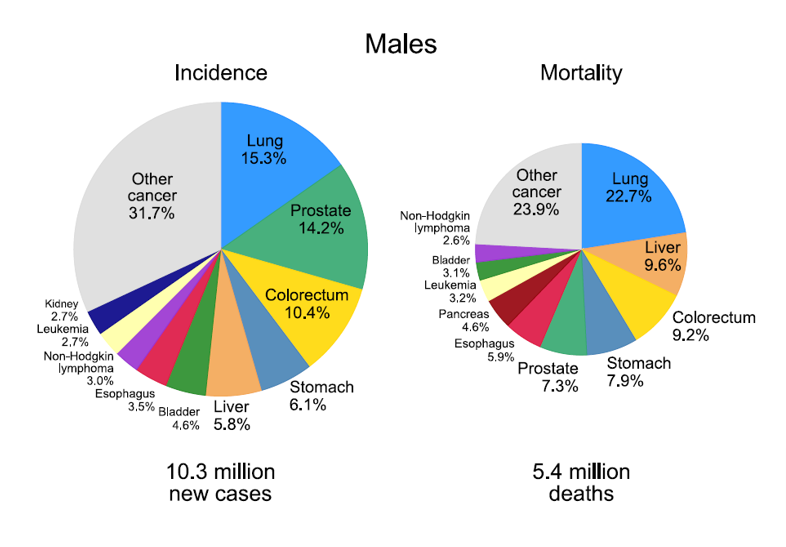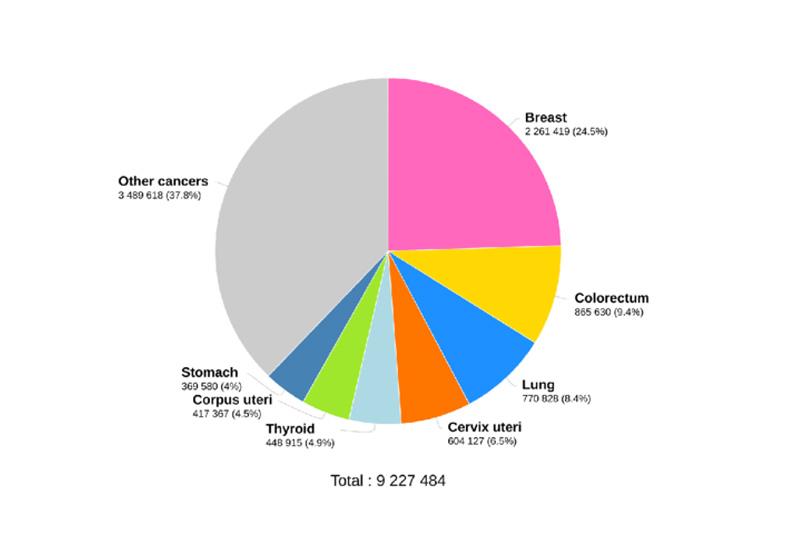Authors: Sandra Elmasry, MD – Donald Northfelt, MD – Holly Geyer, MD
What is Cancer?
Cancer is a disease where cells grow and multiply out of control. These cells change and start to act differently from normal cells, forming collections of cells called tumors and sometimes spreading to other parts of the body. As cancer cells grow, they go through changes over time, much like natural selection, which means only the strongest ones survive and keep growing. These changes make the cells more dangerous and difficult to treat.
What are the different Stages of Cancer?
Cancer is a disease where cells grow out of control and change in ways that make them dangerous.
These changes happen because of several key features:
- Uncontrolled Growth: Cancer cells keep dividing without stopping, ignoring the normal rules that tell cells when to stop growing.
- Evolution: Inside a tumor, cancer cells change and adapt over time. The cells that grow faster or survive better are more likely to spread.
- Avoiding Cell Death: Normally, damaged cells die, but cancer cells find ways to avoid this, allowing them to live longer than they should.
- New Blood Supply: Cancer cells can grow new blood vessels to bring in the oxygen and nutrients they need to keep growing.
- Spreading: Cancer cells can move to other parts of the body and create new tumors, which makes the disease harder to treat.
- Unstable Genes: Cancer cells often have unstable DNA, which leads to more changes that help them survive, especially when facing treatments.
All these features make cancer complex and hard to treat.
How common is cancer?
The chance of getting cancer during your lifetime differs around the world and depends on modifiable and non-modifiable risk factors like where you live, your age and gender, your lifestyle, and even your economic status.
Globally, about 1 in 4 people (25.10%) will develop cancer at some point in their lives. This risk is higher for men, at 26.27%, compared to 23.96% for women. The risk also changes based on where you live. In countries with a high Human Development Index (HDI), like the U.S. or Western Europe, the lifetime cancer risk is around 38.48%, while in countries with a low HDI, it’s only about 10.34%.
In the United States, the lifetime risk for cancer is even greater. Men have a 39.5% chance of getting cancer, and women have a 37.6% chance, meaning about one in three people will face this disease. This higher risk is partly because cancer is found more often and people are living longer. These numbers show how important it is to focus on cancer prevention and make sure health systems are ready to handle the different risks faced by various populations.
Ways to Help Prevent Cancer
To lower the high chance of getting cancer in someone’s lifetime, there are several proven strategies that focus on lifestyle changes:
- Keep a Healthy Weight: Being obese increases the risk for many types of cancer, like breast, colorectal, and pancreatic cancer. It’s recommended to have a body mass index (BMI) between 18.5 and 27.5 kg/m².
- Eat a Healthy Diet: Eating more fruits, vegetables, whole grains, and lean proteins while cutting back on processed foods and red meats can help lower cancer risks. The American Cancer Society highlights the benefits of a plant-based diet for preventing cancer.
- Exercise Regularly: Getting at least 150 minutes of moderate exercise or 75 minutes of more intense exercise each week is linked to a lower risk of several cancers, including breast and colorectal cancers.
- Don’t Use Tobacco: Smoking is the main cause of lung cancer and is connected to many other types of cancer. Quitting smoking is very important for preventing cancer.
- Limit Alcohol Intake: It’s best for women to have no more than one drink per day and men to have no more than two. Drinking too much alcohol is linked to cancers such as breast, liver, and esophagus cancer.
- Get Vaccinated: Vaccines against human papillomavirus (HPV) can help prevent cervical and other HPV-related cancers. The nine-valent HPV vaccine is recommended for both boys and girls before they become sexually active. Similarly, vaccination against hepatitis B can help prevent liver cancer.
- Protect Your Skin from the Sun: Avoiding too much sun and using sunscreen can help reduce the risk of skin cancers, like melanoma.
Common types of Cancer
The most common types of cancer worldwide, based on how often they occur and how many deaths they cause, include:
Common forms of cancer in the United States, along with their prevalence based on recent statistics, include:
- Breast Cancer: This is the most common cancer among women. About 1 in 8 women (approximately 13%) will develop breast cancer in their lifetime.
- Lung Cancer: This is one of the leading causes of cancer deaths in both men and women and largely due to tobacco usage. About 1 in 16 Americans (approximately 6%) will develop lung cancer in their lifetime.
- Prostate Cancer: The most common cancer among men, it affects about 1 in 8 men (approximately 13%). This cancer is also more common in black men than in other demographics.
- Colorectal Cancer: This type includes cancers of the colon and rectum. About 1 in 24 Americans (approximately 4%) will develop colorectal cancer.
- Skin Cancer (Non-Melanoma): This includes basal cell carcinoma and squamous cell carcinoma. These are the most common cancers overall, but they are often not included in cancer statistics because they are frequently treated and not fatal. Skin cancer is diagnosed in over 5 million people each year, but specific prevalence rates can vary widely.
- Bladder Cancer: About 1 in 27 Americans (approximately 3.7%) will develop bladder cancer.
- Uterine Cancer: This is the most common cancer of the female reproductive system. About 1 in 35 women (approximately 3%) will be diagnosed with uterine cancer in their lifetime.
These cancers make up a large part of the global cancer burden, with differences in how often they happen and how deadly they are based on where people live, their lifestyle, and their access to healthcare.

What are the most common cancers in men?
- Prostate Cancer
- Lung Cancer
- Colorectal Cancer

What are the most common cancers in women?
- Breast cancer
- Lung Cancer
- Colorectal Cancer
© 1998-2024 Mayo Foundation for Medical Education and Research (MFMER). All rights reserved

Sign up for Updates
To stay up to date please provide your email address.
-
By giving us your email you are opting-in to receive news and promotions
Sign up for Updates
To stay up to date please provide your email address.
-
By giving us your email you are opting-in to receive news and promotions







